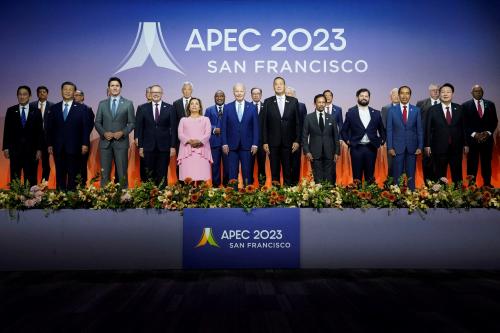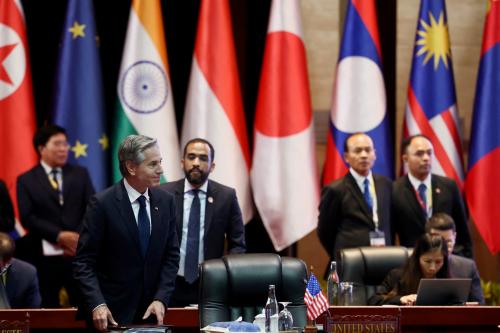NATO’s threat of air strikes against Serbia appears to have worked. As the final hours of the once-extended deadline approached, Yugoslav President Slobodan Milosovic pulled back many of the army and police forces he sent to Kosovo when the crackdown started last March. Serb troops inside Kosovo redeployed to their barracks, abandoned makeshift police stations, and dismantled intimidating checkpoints. As a result, the humanitarian catastrophe that loomed large as winter approached will now likely be averted.
Yet NATO’s intervention offers no lasting solution for Kosovo, which requires a decision on the province’s future status. Despite an international consensus rejecting independence, it now seems clear that a solution short of that is unlikely. Events on the ground over the past eight months have destroyed any hope for a negotiated solution. What is more, NATO’s very intervention strengthens the forces inside Kosovo that favor independence and deters Mr. Milosovic’s capacity to prevent this eventuality.
NATO’s action has created a serious dilemma. Allied leaders have long understood that intervention—or even the credible threat of intervention—would have a profound impact on the military balance in Kosovo. A major reason they did not threaten air strikes earlier this year was the fear that doing so would strengthen the pro-independence Kosovar Liberation Army (KLA), which was then believed to control over 40 percent of the province’s territory, and whose aims and methods NATO did not share. Instead, NATO stood by as Mr. Milosovic’s forces systematically—and often brutally—reestablished Serb control.
But the KLA was not defeated, only disrupted. With the departure and redeployment of Serb forces in response to NATO’s threat, a well-rested, well-trained, well-armed, well-financed KLA is rapidly filling the vacuum left in the Serbs’ wake. Each abandoned Serb police station now becomes a new KLA outpost, and each village reoccupied by erstwhile refugees a new KLA stronghold. Indeed, left to their own devices, the KLA and its supporters throughout Kosovo will create new realities on the ground that in the end will be indistinguishable from de facto independence.
This is not the outcome NATO ambassadors had in mind when they approached the “activation order” placing 400 airplanes at the NATO commander’s disposal two weeks ago. Each NATO member—Washington as well as London, Paris and Bonn—insisted all along that Kosovo must remain an integral part of Yugoslavia, if not of Serbia. Independence, they feared, would set a dangerous precedent of willy-nilly changing Europe’s borders. In the case of Kosovo, independence could also have dire strategic consequences for the region given the existing instability in Albania and the possibility of the large Albanian minority in Macedonia demanding similar status.
NATO’s only hope now is to prevent Kosovo’s independence by insisting that the cease-fire hold long enough for the diplomatic process to produce a generally acceptable autonomy agreement. But this is hope triumphing over experience. Eight months of Serb terror have left every Kosovar with the determination to achieve independence sooner rather than later. Why, moreover, would any Kosovar politician (let alone fighter) accept anything less than independence now that Serb forces are on the run, thanks to NATO’s most recent threat?
Whence NATO’s Kosovo dilemma. If the Alliance wants to prevent Kosovo’s de facto independence, the KLA must be stopped. This could happen in one of two ways. NATO could do what it did this summer and allow Mr. Milosovic to squash the KLA. Or NATO could deploy substantial ground forces to cut off the flow of arms to Kosovo from Macedonia and Albania and to pose as an intimidating presence to the rebel fighters.
NATO’s painful choice can be resolved only if Kosovo’s independence is accepted, if not de jure then at least de facto. The alternatives are clearly not acceptable. Allowing Serb forces once again to engage in the kind of behavior NATO’s threats were designed to halt would make a mockery of its earlier action and critically undermine the credibility of future Alliance threats. As for deploying tens of thousands of NATO ground troops, even if this did not get the Alliance mired in an ugly conflict, it would entail an expensive long-term commitment of troops and treasure at least on a par with the one NATO has already made in Bosnia. In Washington, there is no political basis—or strategic grounds—for making such a commitment.
That leaves independence, or at the very least accepting that Kosovo will become akin to Serbia what Chechnya is to Russia—a statelet independent in all but name that is governed according to the will of the vast majority of its people. Rather than denying this outcome, Washington and its allies should begin to prepare for its arrival by engaging Kosovo’s neighbors in an effort to manage the regional consequences of independence—be it de facto, de jure or somewhere in between.



Commentary
Op-edSlouching toward a breakaway Kosovo
November 4, 1998